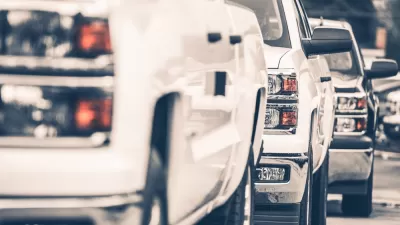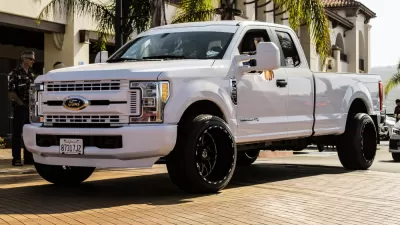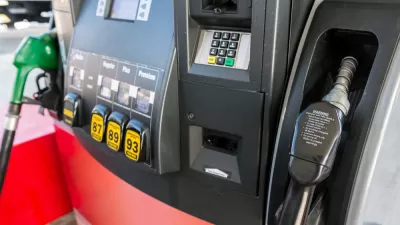PBS' Hari Sreenivasan and guests share impressions of the North American Auto Show held in Detroit last week. Trucks and luxury cars were the focus, not electric and super-efficient vehicles. Debate on fuel efficiency standards is predicted in 2017.
What a change from last year's auto show that highlighted the new electric vehicles! Moderator Hari Sreenivasan notes that "there was such a push a few years ago about these small vehicles, these more efficient vehicles. And here we are rolling out trucks. They might be lighter, but they're still big trucks."
Guest Karl Brauer of Kelley Blue Book explains that "we have got technology now that is making trucks and SUVs get the kind of mileage that economy cars used to get. I think that is one of the things that you have to keep in mind when you look at the horsepower numbers and the performance numbers these cars are getting;" yet he also reflected on the different focus of this year's North American International Auto Show.
And it really was interesting to walk through the show...this year and see almost nothing...about...alternative, super-high-fuel-efficiency technologies. It was really more about performance and capability.
However, Dan Neil, auto columnist of The Wall Street Journal notes one exception, though fittingly in a truck.
The Ford F-150 is being built out of aluminum. This is a radical and risky step forward for the company that makes the most popular vehicle in America for 32 years running. I mean, they sold three-quarters-of-a-million of these trucks last year. They are going to make it out of aluminum. And it's going to save, on average, they estimate three miles per gallon.
His colleague, Joseph B. White, the Journal's Detroit Bureau Chief, explains one of the factors behind the performance focus, and what it portends for meeting the EPA's rigorous fuel efficiency standards.
What changed? The shale oil revolution has sidelined worries that we are condemned to an endless upward spiral in pump prices. In response, car makers are dialing down efforts to persuade mainstream consumers to embrace electric cars, and instead are racing to develop technology and materials that allow them to offer large, comfortable and fast vehicles that are more efficient.
Consequently, "(t)rucks accounted for more than half of all light vehicles sold in the U.S. last year, a reversal from the prior year. The shift coincided with lower fuel prices," he adds.
Cheap, abundant oil resulting in what Dan Neil called "moderate fuel price pressures" will culminate in "a new and intense debate over federal fuel economy regulations leading up to a 2017 review of whether the regulation calling for a 54.5 mpg fleet in 2025 make sense," according to White.
FULL STORY: Big trucks lose weight, gain greater efficiency for Detroit Auto Show

Planetizen Federal Action Tracker
A weekly monitor of how Trump’s orders and actions are impacting planners and planning in America.

Maui's Vacation Rental Debate Turns Ugly
Verbal attacks, misinformation campaigns and fistfights plague a high-stakes debate to convert thousands of vacation rentals into long-term housing.

Restaurant Patios Were a Pandemic Win — Why Were They so Hard to Keep?
Social distancing requirements and changes in travel patterns prompted cities to pilot new uses for street and sidewalk space. Then it got complicated.

In California Battle of Housing vs. Environment, Housing Just Won
A new state law significantly limits the power of CEQA, an environmental review law that served as a powerful tool for blocking new development.

Boulder Eliminates Parking Minimums Citywide
Officials estimate the cost of building a single underground parking space at up to $100,000.

Orange County, Florida Adopts Largest US “Sprawl Repair” Code
The ‘Orange Code’ seeks to rectify decades of sprawl-inducing, car-oriented development.
Urban Design for Planners 1: Software Tools
This six-course series explores essential urban design concepts using open source software and equips planners with the tools they need to participate fully in the urban design process.
Planning for Universal Design
Learn the tools for implementing Universal Design in planning regulations.
Heyer Gruel & Associates PA
JM Goldson LLC
Custer County Colorado
City of Camden Redevelopment Agency
City of Astoria
Transportation Research & Education Center (TREC) at Portland State University
Jefferson Parish Government
Camden Redevelopment Agency
City of Claremont





























